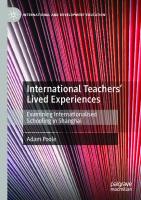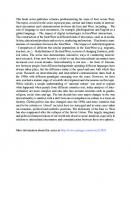Examining Morocco s Education Governance in Global Context Insights from International Education Surveys
Examining Morocco s Education Governance in Global Context Insights from International Education Surveys
135 40 372KB
English Pages [9] Year 2023
Recommend Papers

- Author / Uploaded
- Dr. zeroual khalid
File loading please wait...
Citation preview
Examining Morocco's Education Governance in Global Context: Insights from International Education Surveys
Dr. zeroual khalid Université Mohammed V de Rabat Faculté des sciences This paper delves into the intricate landscape of education governance in Morocco, exploring its alignment with global standards as reflected in international education surveys. Morocco's educational system has undergone significant reforms, yet its governance framework and practices are distinct in comparison to those of other nations. Drawing upon data from prominent international education surveys such as the PISA (Programme for International Student Assessment) and TIMSS (Trends in International
Mathematics and Science Study), this study evaluates Morocco's educational performance, policy implementation, and governance models in relation to global benchmarks. The analysis gives Morocco's policies, curriculum frameworks, and teaching methodologies. By examining the intersections and disparities, this research aims to offer insights into the efficacy of Morocco's education governance and suggests potential strategies for enhancement and alignment with international standards. Keywords: Morocco, Education Governance, International Education Surveys, PISA (Programme for International Student Assessment), TIMSS (Trends in International Mathematics and Science Study), Policy Implementation
A brief history of morocco Morocco has diverse history that spans thousands of years. The region of modern-day Morocco has seen the presence of various civilizations, including the Berbers, Phoenicians, Carthaginians, and Romans. In the 7th and 8th centuries, Arab tribes established control over the region. Berber dynasties emerged, notably the Almoravids, shaping much of the region's culture and architecture. The dynasties ruled during this time, providing stability and shaping Morocco's identity. Morocco retains a diverse cultural heritage with influences from Arab, Berber, African, and European traditions. Tourism and agriculture are significant contributors to Morocco's economy alongside manufacturing and services. Throughout its history, Morocco has embraced its cultural diversity, maintaining a unique blend of traditions while adapting to global changes.
Educational governance in morocco In contrast to the European Union's governance framework for education, where the EU institutions play a supporting role to improve education quality across member states, Morocco's education governance is primarily managed and implemented within the national context. Unlike the EU's approach, where common indicators and benchmarks influence national policies, Morocco's education system is more autonomously structured, with the government taking direct responsibility for developing, implementing, and monitoring its education and training systems. In Morocco, education is a vital component of national identity and integrity. The government takes the lead in establishing education policies and frameworks that cater to the country's specific needs and goals. There might be partnerships or collaborations with international organizations or neighboring countries for educational enhancements, but the governance primarily remains within Morocco's sovereign domain. While the EU emphasizes evidence-based policy implementation and reform like the Education and Training 2020 strategy (ET2020) and the European Semester, Morocco's education governance might utilize different approaches, likely tailored to its unique socio-economic and cultural context. The governance in Morocco may involve collaboration with international partners but are more centralized under the purview of national authorities.
The European Commission's focus on higher education priorities and the promotion of mobility, teaching quality, research, and innovation might differ from Morocco's immediate goals and challenges in its education system. Morocco's approach to education governance is likely designed to address its specific educational needs, aligning with its national development plans and strategies. while the EU relies on transnational governance and benchmarks to influence member states' education policies, Morocco's education governance is more nationally oriented, reflecting the country's individual priorities, challenges, and strategies for educational development.
Soft education governance and educational quality in morocco In the context of Morocco's education governance, the concept of "soft education governance" aligns with the global recognition of education quality as a pivotal asset for social and economic development. The emphasis on cognitive and non-cognitive skills as indicators of quality resonates with Morocco's efforts to enhance its education system. While international bodies like the OECD have advocated for evidence-based policies to promote education quality and equity, Morocco's approach to education governance may differ in terms of direct implementation of these recommendations. The OECD's collection of international data, particularly through surveys like PISA, serves as a reference point for governments worldwide, providing insights to inform evidence-based policies. However, Morocco might adapt these suggestions according to its unique cultural, social, and economic context, retaining autonomy in decision-making. Critics have raised concerns that international organizations like the OECD might inadvertently perpetuate inequalities or infringe upon national integrity in education policymaking. However, there's limited empirical evidence suggesting that Morocco's autonomy in
educational decision-making has been compromised by international influences. Similar to EU member states, Morocco might grapple with a gap between "optimal education policies" and actual educational practices. This gap signifies the challenge of global recommendations into effective local strategies. The adoption of policies suggested by international bodies might necessitate cultural adaptations to suit Morocco's diverse contexts. While the EU's logics, such as the OMC and the Semester Approach, might have an impact on national policy reforms within its member states, Morocco, not being an EU member, might have a different interaction with these frameworks. Morocco's strategies for promoting education quality and equity could involve collaborations with international organizations but would primarily be driven by national agendas and priorities. While Morocco may consider global benchmarks and recommendations, its education governance remains primarily soft, incorporating international insights while preserving autonomy in decision-making to align educational strategies with its unique cultural and socioeconomic landscape. Soft education governance can play a crucial role in fostering peace within Morocco by addressing social, economic, and cultural disparities through educational policies and practices.
conclusion The intersection of education governance and peace in Morocco reflects a multifaceted landscape. Morocco's educational governance, deeply embedded within its national context, contrasts with the transnational influence seen in the European Union's education framework. While global benchmarks from international surveys like PISA and TIMSS guide educational policies globally, Morocco retains autonomy, adapting international insights to suit its unique socio-economic and cultural fabric. The concept of "soft education governance" resonates within Morocco's approach, emphasizing the importance of quality education as a cornerstone for societal advancement. Efforts to align educational strategies with global standards, focusing on cognitive and non-cognitive skills, gives the global acknowledgment of education's role in socio-economic development. The gap between recommended "optimal education policies" and on-ground practices underscores the challenge of translating international recommendations into effective local strategies. This gap highlights the need for cultural adaptations to suit Morocco's diverse contexts, indicating the country's commitment to preserving its cultural identity within educational reforms. While the EU's logics for education governance impact member states, Morocco, as a non-EU member, navigates its educational enhancements independently, leveraging
international collaborations primarily driven by national priorities. In this landscape, soft education governance emerges as a key facilitator of peace in Morocco. By addressing social, economic, and cultural disparities through inclusive education, equitable opportunities, and fostering understanding among diverse groups, Morocco's education system can contribute significantly to societal transformation, fostering a culture of peace, tolerance, and unity. This educational approach, deeply rooted in national context while drawing insights from global standards, plays a pivotal role in fostering peace within Morocco.


![Teachers' Professional Development in Global Contexts : Insights from Teacher Education [1 ed.]
9789004405363, 9789004405349](https://ebin.pub/img/200x200/teachers-professional-development-in-global-contexts-insights-from-teacher-education-1nbsped-9789004405363-9789004405349.jpg)






